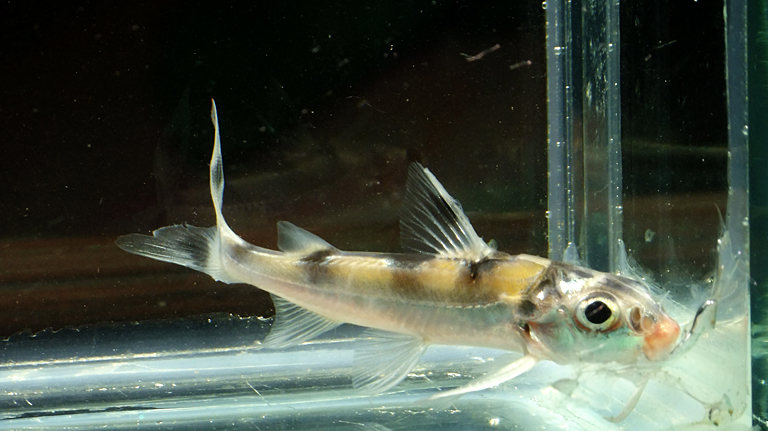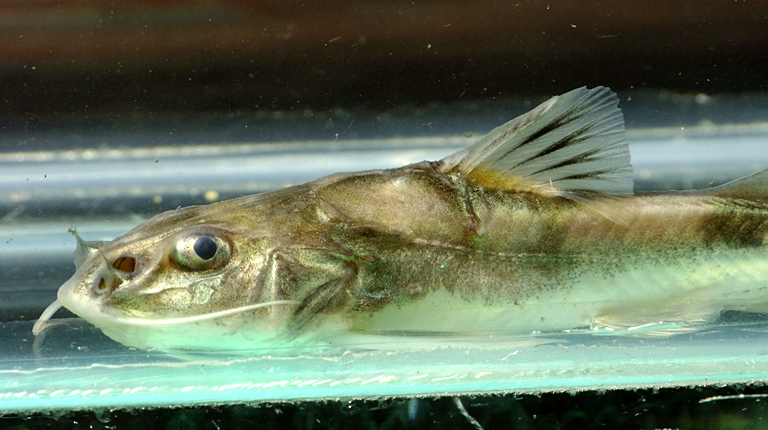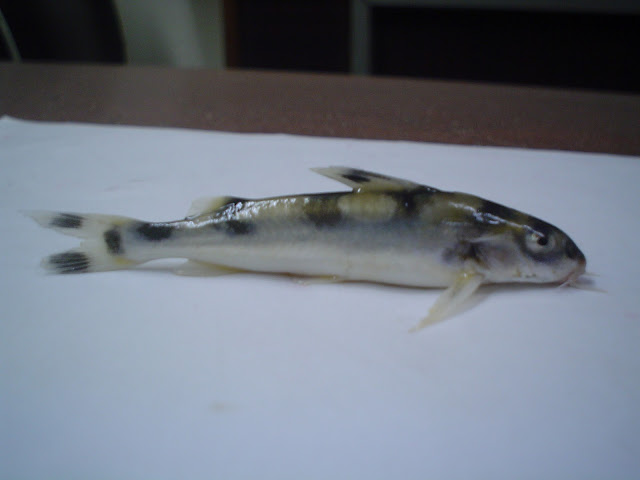Page 1 of 1
Indian Sisorinae
Posted: 24 Jan 2012, 13:02
by Shovelnose


- Bhagirathi/Hooghly river from Kalna, Nadia District, West Bengal. Lovely fish but can be impossibly fragile at times.


- Bhagirathi/Hooghly river from Kalna, Nadia District, West Bengal. Never kept these. Would like to hear experiences if any members have kept this species.


- Ichamati at Parmadan, North 24 Parganas District, West Bengal. Same here never seen one in the flesh.


- Ichamati at Parmadan, North 24 Parganas District, West Bengal. Here too.
All Pics : Nilanjan
I will be in this region in a couple of months. So hoping to collect these plus other sisorid catfish (
here I come!!!!). Till then, its only drooling at pics.

Ps : I will add these pics to the CateLog in a few hours.
Re: Indian Sisorinae
Posted: 24 Jan 2012, 14:04
by Silurus
When I was with fishermen catching Nangra at the Gogangra locality, they started dying on being hauled out of the water, so I would classify these to be about as fragile as Clupeoides borneensis (i.e. just about impossible to capture and keep in an aquarium).
Re: Indian Sisorinae
Posted: 24 Jan 2012, 14:53
by Shovelnose
The habitat was a regular hill stream HH???
That is the 3rd clupeid I hear of with such a bad track record. Dayella malabarica and Ehirava fluviatilis are just as bad. Ehirava are found in Madras. The only way we could bag them was keep the bag in the net and drive them in. Otherwise they died in less than a second.
Re: Indian Sisorinae
Posted: 24 Jan 2012, 15:22
by Silurus
I don't think Nangra is found in hillstreams. The habitat in question is a swift, turbid lowland river (elevation is only about 4 m asl).
Re: Indian Sisorinae
Posted: 24 Jan 2012, 15:26
by Laguviashawi
Heok Hee,
your experience during the collection of Nangra assamensis was an isolated case. I do not recall in which month we got these at the Gogangra site was it in Feb when you had come down with Darren in 1999 or in April 2004 with Antti but I do know the nets used at both times were totally unsuitable for small and fragile fish and the very purpose of netting these was not to bring back any alive but to insert the same into your pickling containers

However, subsequent to that initial collection improvements have been made to catch these fish far more carefully.
I have collected and kept this species very successfully many times over the years and as we speak I have a few hundred in my tanks doing very well and feeding like pigs.
It's ALL in the catching techniques which need to be improvised on and the least stressful methods used to packing and transportation initially.
Once settled in they are fiesty little cats to keep in aquaria.
Re: Indian Sisorinae
Posted: 24 Jan 2012, 19:48
by Jools
Hi Andrew,
Interesting observations. What nets are used to collect these successfully?
Cheers,
Jools
Re: Indian Sisorinae
Posted: 25 Jan 2012, 01:22
by Laguviashawi
Hi Jools,
you were in too on that trip but nursing a bad tummy at the hotel and missed the Bhagirathi river trip for collecting sisorids. During that time we collected many sisorids similar species to what Balaji has shown above and Nangra assamensis among them. A type of dredging net with a log of wood weighted down with bricks and iron bolts was let down into the water from one boat and from another boat ropes attached to one end of the net was used to dredge the river bottom and this way is very effective to ensnare even bottom dwelling fish such as Euryglossa and Cynoglossus species. However, this form of netting puts very great water pressure on the fish trapped leading to great stress and internal injuries which at most times lead to instant death on surfacing as Heok Hee rightly pointed out.
We improved on this by using a type of bag net (sorry no pics at the moment) which basically looks like an inverted umbrella but much, much larger than a lawn one which is inserted into the water and pulled up from time to time. Less fish are caught in this way with the least amount of stress, furthermore fish are transferred into packets directly while the net is still submerged making the whole process very conducive for live collection for aquaria.
Balaji hopes to travel to these parts in April this year and I will definitely take him to the place where both types of nets, the conventional type and the improvised one will be used and he could make a pictorial documentation.
Andrew
Re: Indian Sisorinae
Posted: 25 Jan 2012, 03:03
by Shovelnose
Silurus wrote:I don't think Nangra is found in hillstreams. The habitat in question is a swift, turbid lowland river (elevation is only about 4 m asl).
Oh OK. Any estimate on the temperature HH???
Laguviashawi wrote:Balaji hopes to travel to these parts in April this year and I will definitely take him to the place where both types of nets, the conventional type and the improvised one will be used and he could make a pictorial documentation. Andrew
Indeed. A video of the use of both nets should be good.It will be very interesting to see how these fish are caught and handled. After using hand nets for years to catch fish especially. Really need to buck up and learn to use a cast net seeing how effective they are.
OT : Jools has already warned me about He Man - 9000.

Re: Indian Sisorinae
Posted: 30 Jan 2012, 17:58
by lalramliana
Silurus wrote:I don't think Nangra is found in hillstreams. The habitat in question is a swift, turbid lowland river (elevation is only about 4 m asl).
I have collected three specimens of Nangra nangra (somewhere in May 2010?)from Teirei river, Mizoram. These too from moderately fast, turbid lowland river, elevation is around 48 m asl. From the river It took me 7 hrs to reach home, I carried home by some plastic container (centre fresh/chewing gum container), they were very much alive when I reached home. Those days I dont maintain regular aquarium so I just kept them in some glass container but change water everyday they survived around three weeks (they refused to take food). We used cast net to catch them. (one specimen pectoral fin was stucked on the net and get damaged)
Re: Indian Sisorinae
Posted: 01 Feb 2012, 07:19
by Shovelnose
Do you have any pics (live or preserved) of N.nangra???
Re: Indian Sisorinae
Posted: 01 Feb 2012, 08:44
by lalramliana
Hi Balaji,
I have the preserved specimen in my museum, right now I dont have the pic, but it will be done and sent to you.
Re: Indian Sisorinae
Posted: 27 Jun 2012, 20:37
by mullaji
Hi Balaji,
I'VE collected 14specimen of Gagata Cenia from farrukhabad district in UP .I think 10 dead after 6to7hrs catching from the river,3 able to survive for 2 days n when i bought them home i put them in planted tank n they didn't made till morning.


The problem i found was near their barbels it was a blood ,,may be bleeding
Re: Indian Sisorinae
Posted: 28 Jun 2012, 06:40
by Shovelnose
How exactly did you collect these fish??? These are extremely fragile fish and need to be handled with great care. Small things like transferring them into fish bags without lifting them out of water will help with survival.
You need to acclimatise the fish to tank water. Dropping them into the tank will not help. Plus, these fish also need well oxygenated water. What was the habitat like?? Do you have any pictures of it???
Re: Indian Sisorinae
Posted: 29 Jun 2012, 19:53
by mullaji
I can say that i was to lazy(juvenile) in handling them ,,well picture of habitat was like this

Ganga river at Farrukhabad Bridge





